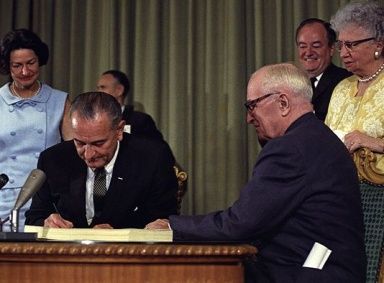1965 - President Lyndon Johnson signs Medicare bill
while President Harry Truman looks on. Truman signed up for Medicare
right away. Image
Address to Congress
President Obama closed his address to the joint session of Congress by scolding those who have raised the absurd charges regarding his health care initiative. It was well timed and diverted attention from fundamental flaws in his proposal.
This article examines the Obama plan as outlined in his speech. His goals were clear and the speech was well structured. The heart of the address provides the type of information necessary to judge the merits of the plan as presented.
Obama got serious when he said, "The plan I'm announcing tonight would meet three basic goals:
"It will provide more security and stability to those who have health insurance.
"It will provide insurance to those who don't.
"And it will slow the growth of health care costs for our families, our businesses, and our government." Pres. Barack Obama, Sept. 9
Cost and availability are the core issues in health care today. They subsume all others. What's missing here? Instead of universal coverage, the uninsured get "insurance," most likely private insurance, if they can afford it. Instead of beating back prices or bold initiatives to reduce them, we're hearing "slow the growth." Health care costs are unaffordable to many already. The promise here seems to be that they'll still be unaffordable, just less so.
"Bending the curve" may happen but it fails to address the key problem -- people can't afford insurance rates and medical bills. As a result they get sick more, suffer more, and die before their time.
"Here are the details that every American needs to know about this plan"
Obama detailed the impact of his plan on two distinct groups, those currently with insurance and those without. This is a key distinction since the public option, for example, is available to only those without insurance.
Those with Insurance
Those with insurance were promised that "nothing in our plan requires you to change what you have." That's assuring to some. But to others who lave plans that are too expensive, plans purchased directly from insurance carriers, there may be a desire or need to change to a more affordable plan. You're out of luck. Let's say that you own a small business and pay $1200 an employee a month for health insurance. The plan offers no apparent benefit other than slowing "the growth of health care costs."
(Note: You can view every article as one long page if you sign up as an Advocate Member, or higher).





